Brazil polarised as Bolsonaro seeks re-election and Lula aims for comeback
- Published
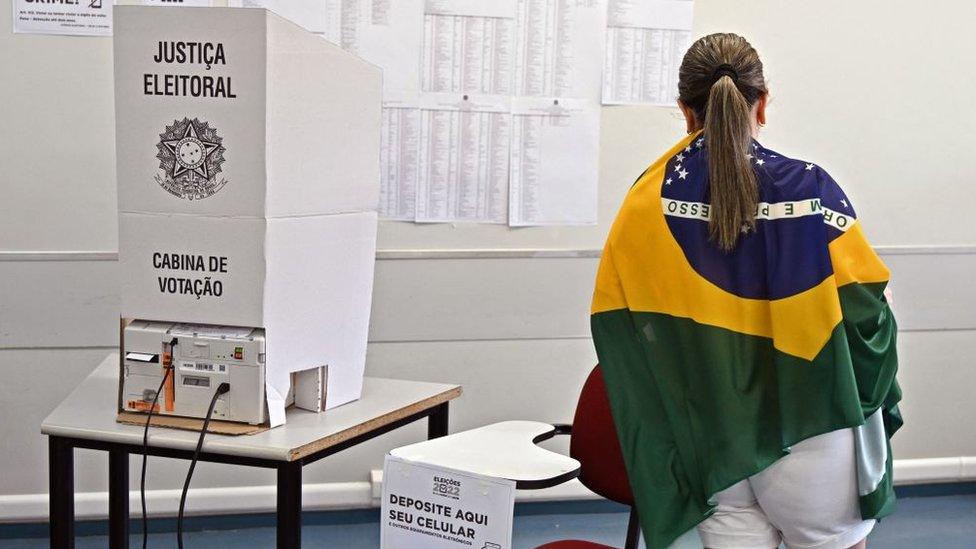
Voting comes after an acrimonious campaign
Brazilians are voting in an election which could see the country switch from a far-right to a left-wing leader.
Voting is compulsory with more than 156 million people eligible.
Incumbent Jair Bolsonaro is seeking a second term but faces a challenge from ex-President Luiz Inácio Lula da Silva.
After voting, Lula said he wanted to get the country "back to normal". Mr Bolsonaro - who has often questioned the electronic voting system - said "clean elections" must be respected.
Mr Bolsonaro has said in the past that if he loses the election, it will be because the voting was rigged.
READ: Is Brazil's voting system open to fraud?
Brazil's electoral authority has dismissed allegations of a possible rigging as "false and dishonest", but the attacks have raised concerns that Mr Bolsonaro may not accept an outcome unfavourable to him.
Quizzed by journalists on the matter on Sunday, he did not directly answer.
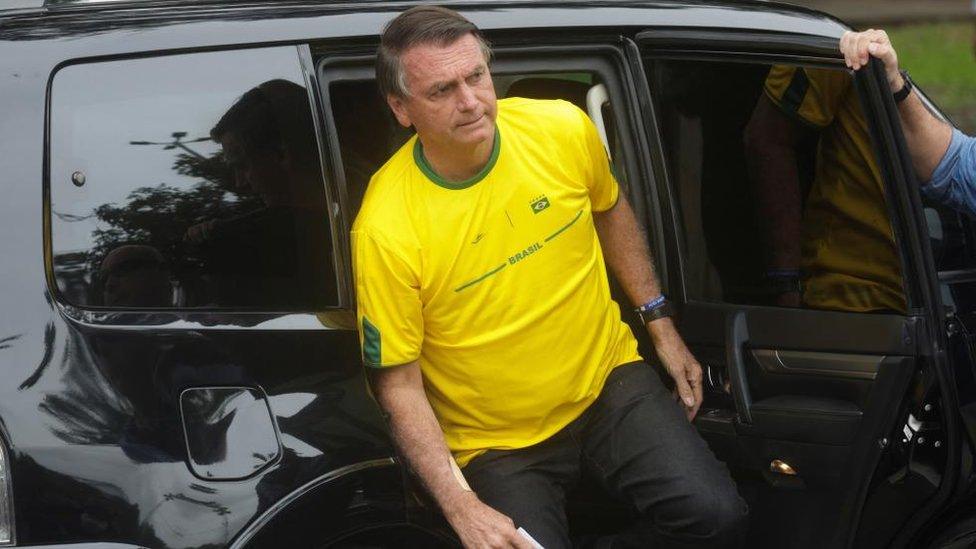
Mr Bolsonaro has questioned electronic voting and refused to say on Sunday whether he would respect the result if he lost
Statements made by the president in the lead-up to the election, such as that only God could remove him from office, have created a tense atmosphere.
A certain nervousness prevailed at two polling stations the BBC visited in Rio as even those wearing Bolsonaro or Lula badges would only provide their first names and refused to have their picture taken.
Many voters are showing who they back by either wearing red - the colour of Lula's Workers' Party flag - or the Brazilian football shirt, which is a favourite of President Bolsonaro and his supporters.
Read: Brazil's yellow shirt gets political in election battle
But there is also a fair share who have opted for subtlety out of fear they may be challenged by rival supporters.
Eighty-seven-year-old Sonia, wearing a blue shirt, lowered her voice when she pointed to her 83-year-old friend Eva, who was wearing green: "If you put our two outfits together, they make up the colours of the Brazilian flag, and that's a sign we back Bolsonaro."
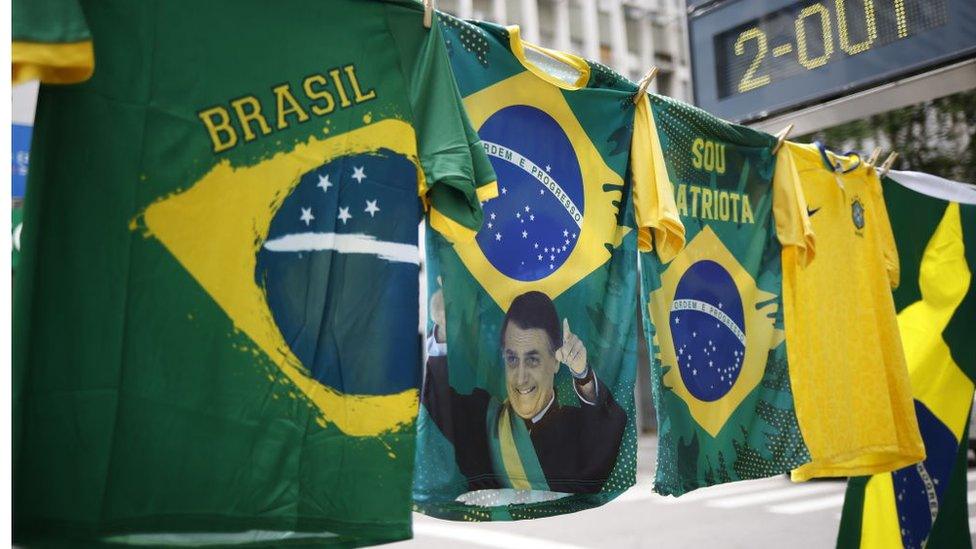
Bolsonaro supporters often wear the colours of the Brazilian flag
"I am a patriot, and I don't want our country to become like Venezuela," she whispered, referring to the fear many Bolsonaro supporters share that a left-wing government could drag Brazil into an economic crisis like the one crippling its northern neighbour.
The two women also think that President Bolsonaro will strengthen family values and combat the breakdown of the traditional family structure as well as make Rio safer so they do not "have to be afraid to go for a walk after dark".
Maria, 54, is also a big fan of Mr Bolsonaro. "There's so many great things he has done, I struggle to narrow it down to a single one," she says before settling on the economy.
"Look, he was dealt a really bad hand, he had to face the pandemic and the subsequent economic downturn but he did wonderfully," she gushes.
"People say he is authoritarian, but that's not true, it's the opposite, he let's people take their own decisions and weigh up risks for themselves," she says, explaining that his anti-lockdown stance during Covid meant that those living hand-to-mouth were able to go to work.
But José, 45, wants President Bolsonaro out of office. "Bolsonaro and his sons are thugs, plain and simple, they should all be in prison."
He voted for the centre-left candidate, Ciro Gomes, in the last election, but this time he will vote for Lula because he thinks he is the only one who can beat President Bolsonaro.
Mark, who works for state-owned oil giant Petrobras, is also casting an "anti-Bolsonaro vote". He says he is no fan of Lula but he strongly objects to Mr Bolsonaro's plans to privatise Petrobras.
Poles apart
Voters polarised views mirror weeks of acrimonious campaigning in which the two main candidates often spent more time trading insults than laying out their policies.
During a televised debate on Thursday, President Bolsonaro called Lula, who served time in prison after being convicted on corruption charges, an "ex-inmate" and a "traitor", while Lula labelled the president "a liar".

Five key facts about Lula
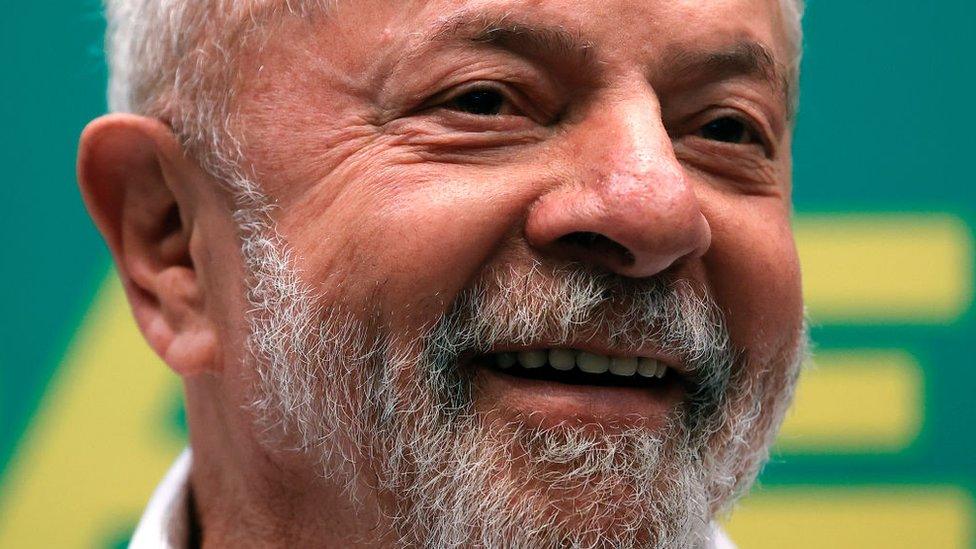
76 years old
left-wing
former metal worker
was president from 2003-2010
imprisoned in 2018 but conviction was later thrown out

Lula was not able to run in the last election in 2018 because he was in jail and barred from standing for office.
His Workers' Party colleague, Fernando Haddad, did not have the same name recognition and failed to inspire left-wing voters in the way Lula does.
Amid widespread discontent with mainstream politics and anger at corruption scandals which had tainted the Workers' Party, far-right lawmaker and former army captain Jair Bolsonaro was swept into office.

Five key facts about Bolsonaro
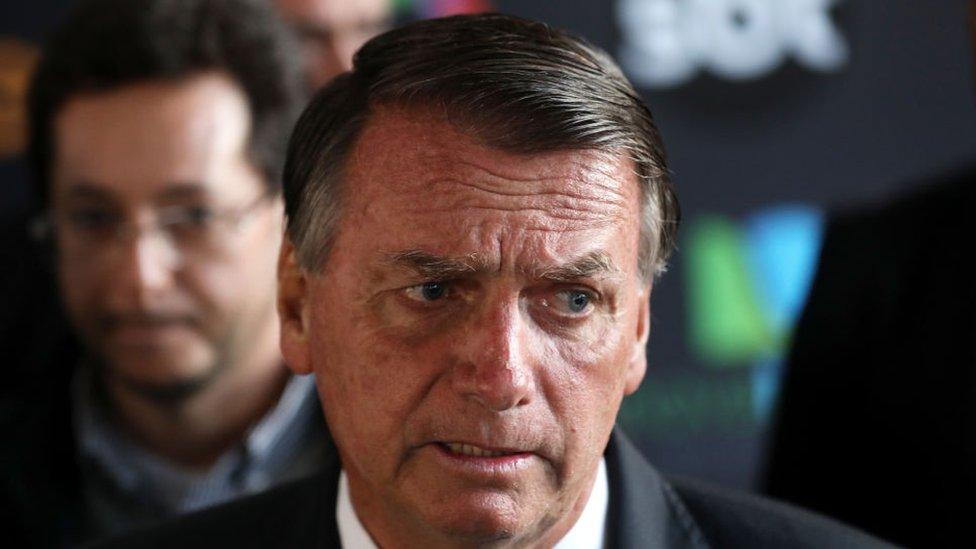
67 years old
far-right
former army captain
running for a second consecutive term
has cast unsubstantiated doubts on the trustworthiness of Brazil's electronic voting system

But with Lula's conviction annulled by the Supreme Court, the former president is very much back on the scene and opinion polls give him a double-digit lead over Mr Bolsonaro.
There are nine other candidates in the running, but polls suggest their support does not amount to more than 10%, leaving Lula and Mr Bolsonaro to battle it out.
The poll is taking place in one the world's most populous democracies, and a result is expected within hours after polls close at 17:00 (20:00 GMT).
One round or two?
Brazil's electoral system requires that a candidate win more than 50% of the valid votes cast in order to be declared president outright.
If none of the candidates gets the necessary votes in the first round on 2 October, a run-off will be held between the top two on 30 October.
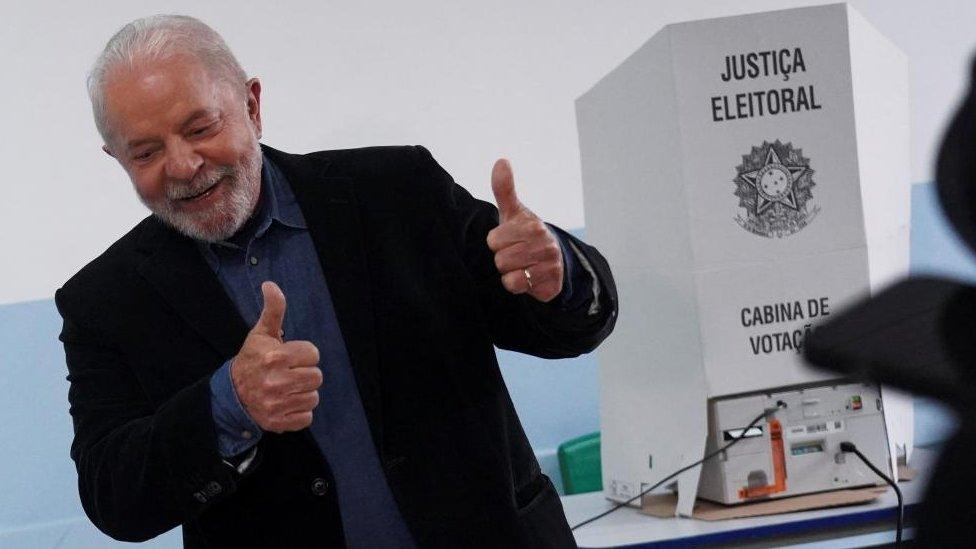
Lula pledged to get Brazil "back to normal" after casting his vote
Opinion polls have consistently shown Lula in the lead and there is a small chance he could win the presidency in the first round, something which has not happened since centre-right President Fernando Henrique Cardoso was re-elected in 1998.
However, many Bolsonaro supporters remain confident of victory and the president himself believes he can win outright in the first round.
Poverty on the rise
Growing levels of poverty - hunger is said to affect more than 33 million of Brazil's 214 million inhabitants - have boosted support for Lula, who during his previous presidencies lifted millions out of poverty through generous social programmes.
But the growth of evangelical churches has played into the hands of President Bolsonaro, who - while himself not evangelical - has, nonetheless, aligned himself closely with evangelical pastors.
READ: ‘We'll vote for Bolsonaro because he is God’
One of those supporting the incumbent is Jean Regina, vice-president of the think tank Brazilian Institute of Law and Religion.

Jean Regina will vote for Jair Bolsonaro on Sunday
According to him, religious leaders find "that the president's rhetoric aligns with what they hold dear, which is the free exercise of their religion and many moral aspects of social life".
While Mr Regina highlights Mr Bolsonaro's defence of the traditional family, this is something Vin Vogel, author and illustrator of young readers' books, objects to.
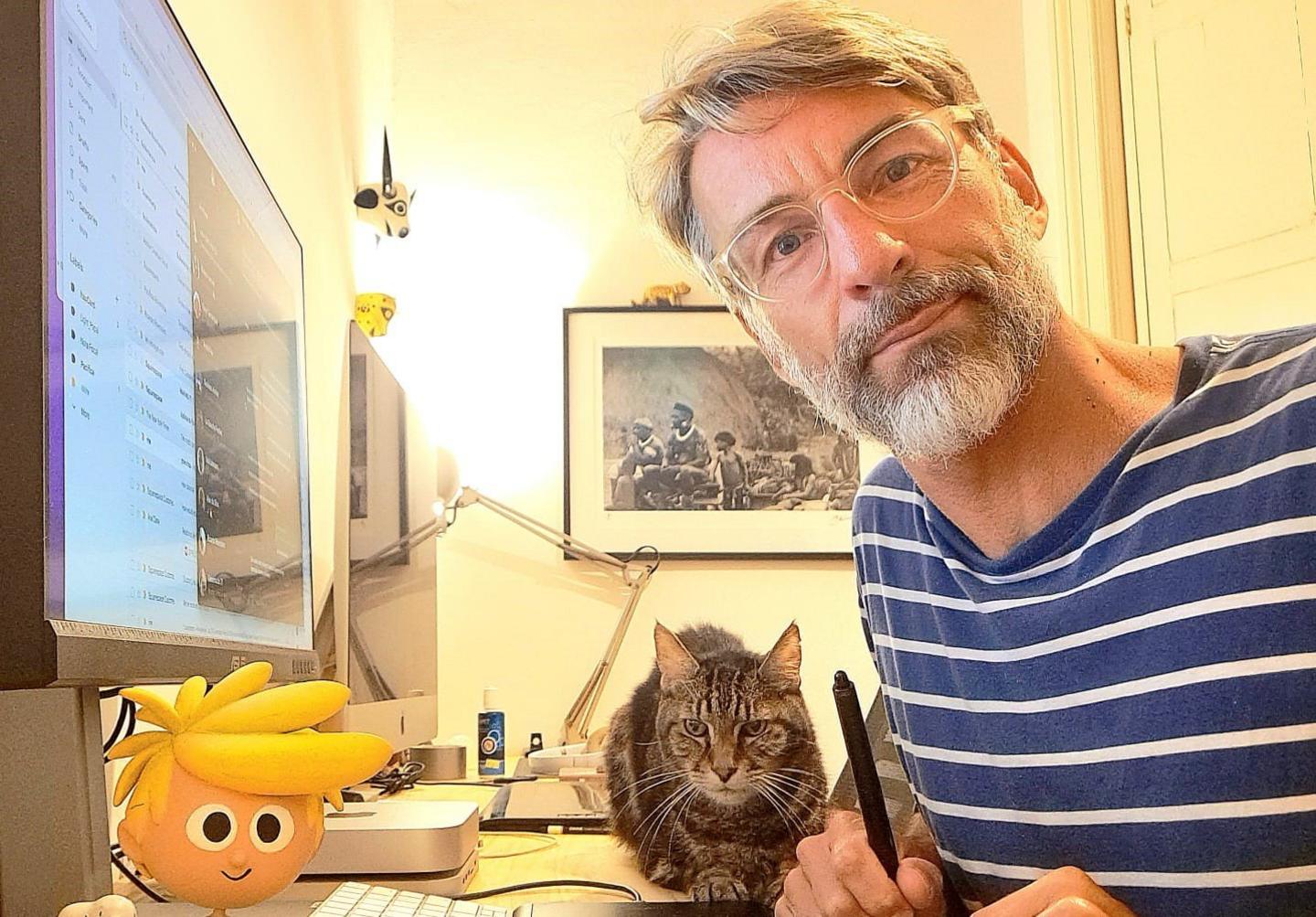
Vin Vogel resents the cuts to the arts and education that have been made under President Bolsonaro
He says that "as a citizen who happens to be homosexual, I was so depressed when this openly homophobic person" was elected.
But his rejection of President Bolsonaro goes further than that. "There is nothing in this man that I like. He is a threat to democracy, to LGBT people, to indigenous people, so when he was elected, I thought, 'The bully has won the fight.'"
Similar to other Lula voters, for Mr Vogel, investment in education is the key to levelling inequalities in Brazil.
"There is no way we're going to thrive as a nation if people can't get educated and get access to leisure and culture," he says, adding that he messaged Lula's campaign on social media with a plea to invest in education.